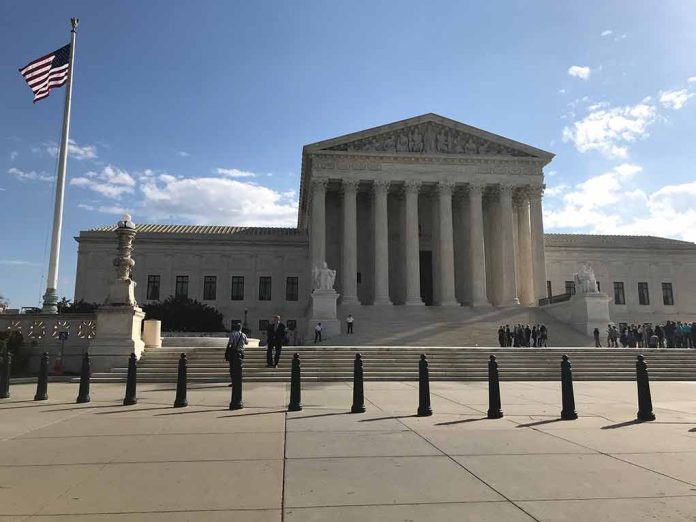
The Supreme Court backs national security over Native American religious rights, rejecting an appeal against a massive copper mining project that will supply 25% of America’s copper needs while devastating Apache sacred lands.
Key Takeaways
- The U.S. Supreme Court declined to hear Apache Stronghold’s appeal to block a copper mine on sacred tribal land, with Justices Gorsuch and Thomas dissenting.
- The project by Resolution Copper (a subsidiary of Rio Tinto and BHP) will mine what’s believed to be the nation’s second-largest copper deposit, potentially providing 25% of America’s copper needs.
- The contested land in Arizona’s Tonto National Forest was transferred from federal ownership to Resolution Copper through a 2014 congressional land swap included in a defense spending bill.
- Critics warn the mining operation will create a massive crater 3 km wide and 304 meters deep, permanently destroying land the Apache use for prayer, ceremonies, and burials.
- The case highlights the ongoing tension between American energy independence, national security interests, and the religious rights of Native American tribes.
Trump-Era Land Deal Moves Forward After Court Victory
The Supreme Court’s decision not to hear Apache Stronghold’s appeal marks a significant victory for Resolution Copper and the Trump administration’s energy independence initiatives. The land transfer, approved by Congress in 2014 and supported by President Trump, gives Resolution Copper access to 9.71 square kilometers of Oak Flat in exchange for other Arizona lands. This copper deposit, believed to be the second-largest in the world, could produce 40 billion pounds of copper – a critical resource for America’s infrastructure, defense, and technology sectors.
“While this Court enjoys the power to choose which cases it will hear, its decision to shuffle this case off our docket without a full airing is a grievous mistake — one with consequences that threaten to reverberate for generations,” said Neil Gorsuch, Supreme Court Justice.
The 9th Circuit Court of Appeals previously ruled 6-5 that the land transfer did not “substantially burden” religious rights, despite Apache claims that the site, known as Chi’chil Bildagoteel, has been central to their religious practices for generations. The majority court opinion prioritized national resource development over what they characterized as religious access claims that weren’t sufficiently documented in legal precedent. This ruling aligns with conservative priorities emphasizing American energy independence and national security concerns.
Conservative Justices Break Ranks in Defense of Religious Liberty
In a surprising move, conservative Justices Neil Gorsuch and Clarence Thomas broke with their colleagues, describing the court’s refusal to hear the case as “a grave mistake.” Their dissent highlights the complex intersection of religious liberty principles that conservatives typically champion and business interests that are also central to conservative economic policy. Justice Gorsuch, a Trump appointee known for defending religious freedom, expressed particular concern about the precedent this decision sets for government respect of religious rights.
“Extensive consultation… ongoing dialogue will continue to shape the project,” said Vicky Peacey, Resolution Copper representative.
Resolution Copper has attempted to frame the decision as balanced, emphasizing their commitment to consultation with tribal interests. However, the Apache Stronghold and other tribal representatives reject this characterization, arguing that no amount of consultation can mitigate the permanent destruction of sacred land. The planned mining operation will eventually create a massive crater approximately 3 kilometers wide and over 300 meters deep, permanently altering the landscape that Apache people have used for religious ceremonies for centuries.
Broken Promises and National Priorities
The case highlights a continuing pattern of broken promises to Native American tribes. The San Carlos Apache claim the government has failed to honor an 1852 treaty promising to protect Apache interests on the land. The land swap was not standalone legislation but was tucked into a 2014 defense spending bill, limiting congressional debate on its merits. This legislative maneuver provided Resolution Copper access to valuable resources while overriding indigenous religious concerns through procedural tactics rather than open democratic processes.
“While this decision is a heavy blow, our struggle is far from over. We urge Congress to take decisive action to stop this injustice while we press forward in the courts,” said Wendler Nosie Sr., Apache Stronghold leader.
The court’s decision represents a clear prioritization of American resource independence and economic interests over religious concerns of a minority population. With copper being essential for electrical infrastructure, military equipment, and renewable energy technologies, the national security implications of domestic copper production likely influenced the court’s decision. The project is expected to create hundreds of jobs and significant economic activity in Arizona while reducing American dependence on foreign copper sources during a time of increasing global competition for critical minerals.





